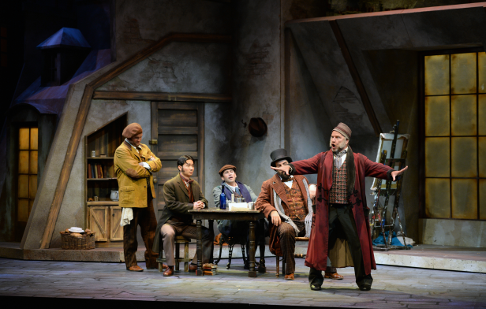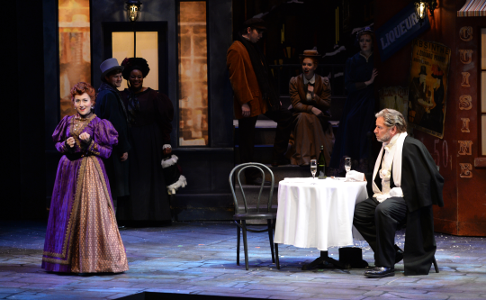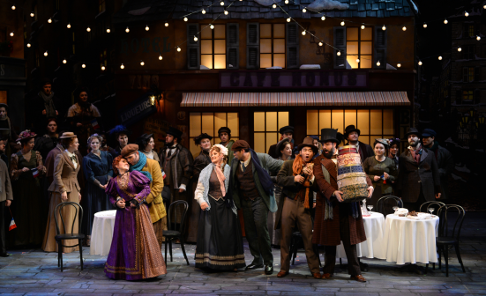![Scene from La bohème [Photo by Duane Tinkey courtesy of Des Moines Metro Opera]](http://www.operatoday.com/DSC_4076.png)
28 Jul 2019
Sublime Bohemians Captivate Indianola
Des Moines Metro Opera closed their wholly winning 47th festival season with a wondrously sung, theatrical vivid, and emotionally bewitching treatment of Puccini’s evergreen masterpiece, La bohème.
English Touring Opera are delighted to announce a season of lyric monodramas to tour nationally from October to December. The season features music for solo singer and piano by Argento, Britten, Tippett and Shostakovich with a bold and inventive approach to making opera during social distancing.
This tenth of ten Live from London concerts was in fact a recorded live performance from California. It was no less enjoyable for that, and it was also uplifting to learn that this wasn’t in fact the ‘last’ LfL event that we will be able to enjoy, courtesy of VOCES8 and their fellow vocal ensembles (more below …).
Ever since Wigmore Hall announced their superb series of autumn concerts, all streamed live and available free of charge, I’d been looking forward to this song recital by Ian Bostridge and Imogen Cooper.
Although Stile Antico’s programme article for their Live from London recital introduced their selection from the many treasures of the English Renaissance in the context of the theological debates and upheavals of the Tudor and Elizabethan years, their performance was more evocative of private chamber music than of public liturgy.
Evidently, face masks don’t stifle appreciative “Bravo!”s. And, reducing audience numbers doesn’t lower the volume of such acclamations. For, the audience at Wigmore Hall gave soprano Elizabeth Llewellyn and pianist Simon Lepper a greatly deserved warm reception and hearty response following this lunchtime recital of late-Romantic song.
For this week’s Live from London vocal recital we moved from the home of VOCES8, St Anne and St Agnes in the City of London, to Kings Place, where The Sixteen - who have been associate artists at the venue for some time - presented a programme of music and words bound together by the theme of ‘reflection’.
'Such is your divine Disposation that both you excellently understand, and royally entertaine the Exercise of Musicke.’
‘And there was war in heaven: Michael and his angels fought against the dragon; and the dragon fought and his angels, And prevailed not; neither was their place found any more in heaven … that old serpent … Satan, which deceiveth the whole world: he was cast out into the earth, and his angels were cast out with him.’
There was never any doubt that the fifth of the twelve Met Stars Live in Concert broadcasts was going to be a palpably intense and vivid event, as well as a musically stunning and theatrically enervating experience.
‘Love’ was the theme for this Live from London performance by Apollo5. Given the complexity and diversity of that human emotion, and Apollo5’s reputation for versatility and diverse repertoire, ranging from Renaissance choral music to jazz, from contemporary classical works to popular song, it was no surprise that their programme spanned 500 years and several musical styles.
The Academy of St Martin in the Fields have titled their autumn series of eight concerts - which are taking place at 5pm and 7.30pm on two Saturdays each month at their home venue in Trafalgar Square, and being filmed for streaming the following Thursday - ‘re:connect’.
The London Symphony Orchestra opened their Autumn 2020 season with a homage to Oliver Knussen, who died at the age of 66 in July 2018. The programme traced a national musical lineage through the twentieth century, from Britten to Knussen, on to Mark-Anthony Turnage, and entwining the LSO and Rattle too.
With the Live from London digital vocal festival entering the second half of the series, the festival’s host, VOCES8, returned to their home at St Annes and St Agnes in the City of London to present a sequence of ‘Choral Dances’ - vocal music inspired by dance, embracing diverse genres from the Renaissance madrigal to swing jazz.
Just a few unison string wriggles from the opening of Mozart’s overture to Le nozze di Figaro are enough to make any opera-lover perch on the edge of their seat, in excited anticipation of the drama in music to come, so there could be no other curtain-raiser for this Gala Concert at the Royal Opera House, the latest instalment from ‘their House’ to ‘our houses’.
"Before the ending of the day, creator of all things, we pray that, with your accustomed mercy, you may watch over us."
The doors at The Metropolitan Opera will not open to live audiences until 2021 at the earliest, and the likelihood of normal operatic life resuming in cities around the world looks but a distant dream at present. But, while we may not be invited from our homes into the opera house for some time yet, with its free daily screenings of past productions and its pay-per-view Met Stars Live in Concert series, the Met continues to bring opera into our homes.
Music-making at this year’s Grange Festival Opera may have fallen silent in June and July, but the country house and extensive grounds of The Grange provided an ideal setting for a weekend of twelve specially conceived ‘promenade’ performances encompassing music and dance.
There’s a “slide of harmony” and “all the bones leave your body at that moment and you collapse to the floor, it’s so extraordinary.”
“Music for a while, shall all your cares beguile.”
The hum of bees rising from myriad scented blooms; gentle strains of birdsong; the cheerful chatter of picnickers beside a still lake; decorous thwacks of leather on willow; song and music floating through the warm evening air.
![Scene from La bohème [Photo by Duane Tinkey courtesy of Des Moines Metro Opera]](http://www.operatoday.com/DSC_4076.png)
Des Moines Metro Opera closed their wholly winning 47th festival season with a wondrously sung, theatrical vivid, and emotionally bewitching treatment of Puccini’s evergreen masterpiece, La bohème.
This handsome physical production by set designer Robert Little was a worthy revival from the 2011 season. While Mr. Little may break no real new visual ground, he does splendidly fill the stage with three beautifully dressed and imposing settings that effectively satisfy all our sentimental, dreamy images of an idealized bygone Paris. If I had one wish, I would have loved for the transition from Act I to Act II to have been shorter. That said, when the curtain rose on Act II’s overwhelming, over populated Monmartre street scene, the revelation was greeted with appreciative applause that reveled in the scenic accomplishment.
Sarah Riffle lit the proceedings with an admirably calculated design that found great nuance between indoor and outdoor settings as well as varying times of day. From the warmth and joyous colorings in the palette for the first two upbeat acts, Ms. Riffle transitioned most effectively to cooler tones when the lovers’ troubles have set in. Her eventual moody illumination as tragedy visits the garret had meaningful impact.

Heather Lesieur effectively coordinated a truly lovely and large set of period costumes provided by Malabar Ltd. All festival long, Brittany Crinson’s make-up and hair designs were exemplary, and this emphatically proved true once more for La bohème.
In the best sense of the word, this was a decidedly traditional approach, some might even say “old fashioned.” I am always reminded that when a critic sniffed that “Annie, Get Your Gun” was old-fashioned, composer Irving Berlin retorted: “Yeah, an old-fashioned smash!” And so it is here.
“Team Bohème” has trusted the surefire material and eternal appeal of the melodious score and did everything possible to frame it beautifully and stage it with exuberant freshness. Director Octavio Cardenas has brought an abundance of imaginative stage business to bear, all the while he skillfully accommodates the time honored performance traditions of the signature moments.
The interaction between the men’s quartet was especially detailed and filled with resourceful playfulness. The lovers’ flirtations, first between Rodolfo and Mimi, and then Musetta and Marcello, were sexily inevitable. The character relationships had specificity, movement was well motivated, and the crowd scenes were tightly controlled as the groupings fluidly morphed to accommodate the script’s demands. Both Lisa Hasson’s Apprentice chorus and Barbara Sletto’s Children’s Chorus did themselves proud.

Conductor Michael Christie led an assured, stylistically sound, and dramatically pliable reading, inspiring the exceptional DMMO orchestra to respond with an ensemble effort that ranged in effects from luxuriant, to lush, to comtemplative, to crackling. Maestro Christie excelled at accommodating his singers, partnering them with great finesse. And what a set of soloists they were!
Tenor Joshua Guerrero’s opulent spinto instrument was all you could wish for, as he conquered the role of Rodolfo. Mr. Guerrero had an impetuous, boyish appeal that illuminated the opening acts, as he sang with fresh-voiced abandon and pranced about with ebullient youthfulness. By Act III, the performer ably weighted his delivery with appropriate pathos and despair. His straightforward Italianate style was tremendously appealing, even down to the occasional sobbing catch in a phrase or three.
He was beautifully paired with his Mimi, the radiant soprano Julie Adams. Her rich, luminous tone, plangent delivery, total command in all ranges, and ability to effortlessly ride the most impassioned orchestral passages were thrilling to hear. Ms. Adams is a sincere and unaffected actress, and the heartrending tale of love lost was communicated with unerring commitment and lustrous singing.
Thomas Glass proved an exceptional Marcello, his buzzy, beefy baritone ringing out with character and conviction. His bromance chemistry with Rodolfo yielded many engaging moments and their synergy in the Act III trio, and especially in their party piece duet that begins Act IV was musically ravishing and dramatically touching.
Mané Galoyan discovered her own spunky take on Musetta, one that was longer on sensuality than it was on sass. This not only paid good dividends in Act II’s tease of Marcello, but also laid the groundwork for the more serious side she demonstrates by opera’s end. Ms. Galoyan is a highly proficient soprano, attractive and secure, and she knows just how to utilize it to maximum effect. I am not sure I have ever heard the penultimate note of Quando m’en vo held to such maximum length and effect.

Bewhiskered, brawny Timothy J. Bruno made for an endearing Colline, his orotund bass rolling out with ease and obvious enjoyment. When it came time for him to tug our hearts, Mr. Bruno did not disappoint and obliged with a moving Coat Aria. Tall, slender and nimble, baritone Brian Vu found more in Schaunard’s arsenal than we often encounter. His sizable, incisive baritone contributed a gleaming presence, and his easy stage presence had enormous appeal.
It is a joy to encounter a production that is peopled by actors that actually look like young, struggling artists. I have encountered many stagings in which some, even all of the main quartet of men sported waistline numbers that exceeded even their considerable ages. Kudos to DMMO for so carefully casting such accomplished young stars that also were able to bring the familiar tale to such believable fruition.
Rounding out the cast, bass Matthew Lau found admirable variety in doubling the roles of Benoit and Alcindoro. His solidly sung portrayals found playfulness and camaraderie as the former, and long-suffering frustration as the latter.
By the time this laudable assemblage of talent brought us to the end of their journey, with Rodolfo screaming his anguish at Mimi’s deathbed, the other bohemians grieving each in their own way, the radiant orchestra melting into the tragic final chords, if you didn’t have a lump in your throat and a tear in your eye, well, you were at the wrong address.
La bohème. Des Moines Metro Opera. An “old-fashioned smash,” indeed.
James Sohre
Cast and production information:
Rodolfo: Joshua Guerrero; Marcello: Thomas Glass; Colline: Timothy J. Bruno; Schaunard: Brian Vu; Benoit/Alcindoro: Matthew Lau; Mimi: Julie Adams; Parpignol: Andrew Turner; Musetta: Mané Galoyan; Drum Major: Anthony Benz; Customs Officer: Andrew Gilstrap; Sergeant: Aaron Keeney; Conductor: Michael Christie; Director: Octavio Cardenas; Set Design: Robert Little; Lighting Design: Sarah Riffle; Make-Up/Hair Design: Brittany Crinson; Chorus Master: Lisa Hasson; Children’s Chorus Master: Barbara Sletto